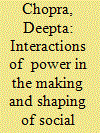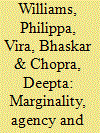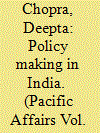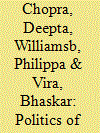|
|
|
Sort Order |
|
|
|
Items / Page
|
|
|
|
|
|
|
| Srl | Item |
| 1 |
ID:
106718


|
|
|
|
|
| Publication |
2011.
|
| Summary/Abstract |
This paper focuses on the interactions of power as analysed through the formulation story of a recently enacted social policy, the National Rural Employment Guarantee Act (NREGA), India. It explains the various drivers that led to the passing of this policy, with a view to analysing the extent and nature of power as was played out in the making of this policy. The paper sets out the way in which social policy formulation can be understood to be arising from interactions and linkages between individual actors, who together make up policy coalitions and networks. These interactions are described through a four-fold classification of processes (parliamentary, executive, party political and civil society) into which the actions and contributions of these actors feed, giving rise to an iterative, messy and complex reality. Power in the policy formulation network is shown as multi-sited as well as relational. The paper concludes with an endorsement for reconfiguring the geographies of power in the form of a kaleidoscope of actors and events, within and through which power flows and is exercised.
|
|
|
|
|
|
|
|
|
|
|
|
|
|
|
|
| 2 |
ID:
103170


|
|
|
|
|
| Publication |
2011.
|
| Summary/Abstract |
The idea of the state has shown remarkable resilience over the last couple of decades, despite assaults on it from neoliberal doctrines and the forces of globalization. During this period, the abiding presence and role of the state has been particularly evident in the contemporary political life of the Asia Pacific region. This article pays special attention to the contemporary Indian state in the context of development. It reflects upon the ways in which the state is experienced, by focusing on questions of marginality, agency and power as they intersect the politics of development. By reading the empirical insights documented within this special issue against a rich trajectory of scholarship on the Indian state, the article argues that there has been a recent qualitative change in the way in which the contemporary Congress-led UPA government has presented itself to the common person. The implementation of pro-poor and more inclusive policies has altered the discursive landscape within which state-society interactions have taken place over the last five years. Importantly, these policies have functioned to reconfigure not only the material interactions between the state and India's marginalized, but also the imagined spaces within which marginal groups renegotiate their relationships with the state.
|
|
|
|
|
|
|
|
|
|
|
|
|
|
|
|
| 3 |
ID:
170267


|
|
|
|
|
| Summary/Abstract |
Employment and work surveys in Nepal have shown a high concentration of women in certain occupations, being flexible, low paid and requiring low skill. In the far-western region (Jumla District, Karnali Zone), the Government of Nepal provides employment to women and men through a public works programme, the Karnali Employment Programme (KEP). This paper assesses the empowerment potential of the KEP and similar employment programmes, and questions whether paid work leads to economic empowerment for women. It provides a glimpse into work patterns in low-income families in Nepal, and juxtaposes the goal of women's economic empowerment through entry into the labour market with their lived realities and needs. The paper uses ILO's Decent Work framework to argue that two key aspects are critical for women's empowerment through paid work: firstly, quality; and secondly, a positive balance between paid work, unpaid work and care work.
|
|
|
|
|
|
|
|
|
|
|
|
|
|
|
|
| 4 |
ID:
103174


|
|
|
|
|
| Publication |
2011.
|
| Summary/Abstract |
This paper problematizes the concept of the state by studying its role and interactions with society in the realm of making policy. To achieve this, the case of a recently formulated social policy in India, the National Rural Employment Guarantee Act (NREGA), is examined. The paper provides empirical evidence of policy making as a complex and iterative process, which is mediated by a multiplicity of actors who operate in relation to each other. In tracing the formulation process of the NREGA, theoretical claims regarding the understanding of the state as an ideological construct as well as comprising of material practices are substantiated. The paper sees policy making as an act of governing, and contributes to ethnographic understandings of fuzzy and porous boundaries between the state and society that are redefined through the act of policy making. This dynamism, it is argued, results in the two-dimensional phenomenon of statecraft: how the state pursues policy making as a strategy for governing its population, and in turn, how the state itself gets reconstituted in the making of policy.
|
|
|
|
|
|
|
|
|
|
|
|
|
|
|
|
| 5 |
ID:
107218


|
|
|
|
|
| Publication |
2011.
|
| Summary/Abstract |
This introduction discusses the articles in this Special Issue, which are all focused on exploring the everyday interactions between marginalised individuals and groups and the state in contemporary India. In particular the articles highlight the experiences of a diverse set of marginalised groups - Muslim artisans and weavers, Dalits, Tibetan exiles and post-conflict victims in Gujarat - in order to work towards an understanding of the politics of citizenship from the margins. Across these articles two interlocking themes emerge. Firstly, how different marginalised groups have experienced, critiqued and engaged with different aspects of the `welfare state'. Secondly, the way in which agencies were articulated from the margins through these processes of engagement, shaping and recasting interactions between the state and society in India. We argue that the deployment of different strategies of engagement with the state by India's marginalised can be viewed as a politics of citizenship, through which marginalised people (re)make themselves as citizens. This essay is thus a call for future research on citizenship as a lived experience which is operationalised in local practices and quotidian interactions between the state and society.
|
|
|
|
|
|
|
|
|
|
|
|
|
|
|
|
|
|
|
|
|